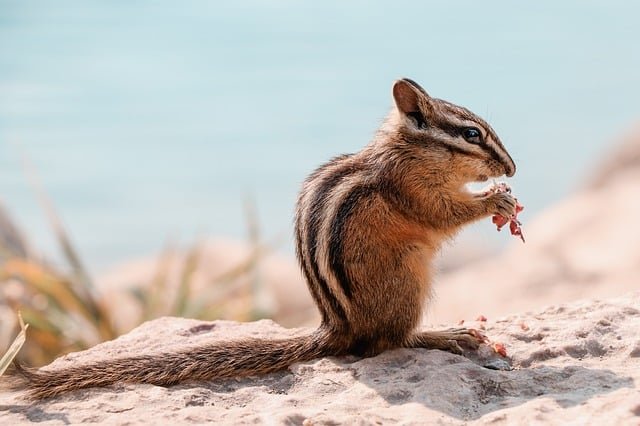15 Best Exotic Pets That Are Easy To Care For (With Pictures)

If you are a person who wants to acquire an exotic animal as a pet or has owned one before but looking forward to finding the best exotic pets that are easy to care for then this article is for you.
We know that the quest for owning an exotic animal is on the rise that’s why we have put together some of the best exotic animals.
So, in this article, you will learn about exotic animals, tips to put into consideration before acquiring one, and their legalities.
Ensure you read this article from start to finish before going out to get an exotic animal for a pet.
Now, let’s get into the details.
What are exotic pets?
Exotic pets are animals that are relatively rare or odd to keep or are often thought of as wild creatures rather than pets.
They are animals that are not domestic animals such as dogs and cats and as such are uncommon.
However, many of them have the qualities of domestic animals but are still considered exotic.
Many birds and fish, which are technically exotic (not domesticated or barely changed from their wild origins), are not regarded as such.
The definition varies by culture, geography, and time as animals become well-established in the world of animal fantasy, they may lose their exotic status.
Let’s find out some tips you need to consider before getting an exotic animal.

You may also like to read about Emotional Support Animals (Everything You Need to Know)
Tips for choosing an exotic pet
When thinking about getting an exotic pet, it’s important to consider why you want one and how much care they’ll need.
Buying an exotic pet has always been a sensitive matter, but there have been some occasions where everything has gone smoothly because a pet parent took the time to think things through before giving it a try.
Here are some quick considerations to put in mind when selecting an exotic pet:
1. Do you have the necessary accommodations and equipment?
Your new pet will need enough space in your home to feel at ease, as well as a home that mimics its own natural habitat.
Some pets, such as ferrets, are allowed to roam freely in your home with supervision, while others are not.
Consider how big your pet will get and get a cage or tank that can accommodate him. Because some might need special equipment such as UV lighting.
Depending on the species, if you adopt more than one of the same animals, they may require a larger home to share or separate homes.
2. Are you aware of the dietary restrictions?
While other types of pets are okay with commercially packed and prepared food, exotic pets will require a daily mix of fresh food.
Some even go as far as requiring live insects or mice as part of their first.
It is important to note that exotic pets can only be fed prepared meat or fresh fruits and vegetables if they are offered human food.
Many species are at risk from processed foods. Regardless of the type of pet you choose, you will need fresh water.
3. Do you know the lifespan?
Pets require commitment, but some pets live longer than others thereby, needing a longer commitment.
Cats and dogs, for example, live around the same amount of time as hermit crabs and chinchillas, however, some snakes and birds might live for fifty years or more.
It’s important to know the lifespan of the exotic pet you plan to get in order to be sure of how long it will stay with you.
4. Is owning a pet legal in your city/state?
Exotic pets are becoming increasingly popular among Americans, and the list of legal exotic pets continues to grow.
Find out if keeping the exotic pet you want is illegal because skipping this step could lead to heartbreak and legal problems.
5. What are the veterinary expenses?
Find a veterinarian who specializes in the care of your pet’s species by doing some research.
Before adopting an exotic animal, it is necessary for you to seek the advice of a veterinarian.
They may assist you in navigating local legislation, locating a trustworthy breeder for adoption, and ensuring that your new pet’s environment is suitable.
6. Are you aware of their Illnesses?
It’s important to remember that exotic animals behave differently than domestic animals.
The capacity of exotic pets to mask their pain is one of the most serious things to take into consideration.
This is a natural defense mechanism that protects them from predators looking for vulnerable food.
It’s important for you to pay close attention to your pet’s behavior to avoid missing any signs of disease.
Your pet will stay in better form if you take him to the vet on a regular basis.
7. What do you plan to do if you stay at work late or have to go on a vacation?
As other pets like cats and dogs will require pet sitting, keep in mind that your exotic animal will require the same.
When going on a quick weekend break or needing to work late, keep in mind that your exotic pet will need attention.
So, don’t hesitate to hire a professional sitter to look after your exotic pet.
Now that you know the things to look out for when seeking to get an exotic pet, head over to Come Get Pets to get the best pet for you.
Related: Top 23 Dog Breeds for Hunting Bears (With Pictures)
Best Exotic Pets that are easy to care for.
The reason these pets that we will be listed below are easy to take care of is due to their friendly nature and low-maintenance lifestyle.
They come with reasonable housing needs, a fair diet, moderate sizes, and pose lower house destruction than others.
1. Hedgehog:

Hedgehogs are thorny mammals that belong to the Erinaceidae subfamily which are not rodents and do not relate to porcupines.
They are commonly known as Hedgies and desire to be on the top of the list because they are the easiest to care for.
While still being exotic, they are good pets that are usually silent and do not need much engagement to be content.
Although the varieties sold in pet stores are slightly modified from their wild form, making them look domesticated.
However, they are nocturnal meaning they get more active during the night slightly when getting close to the end of the day.
They are not social and as such do not suffer from separation anxiety which makes them suitable for persons who travel.
Hedgehogs are suitable for persons who do not want a long-lived pet because their life span is only 5-7 years.
2. Leopard Gecko:

Geckos are exotic reptiles that have a friendly disposition with a distinctive spotted pattern, as a result, makes them stand out.
They like to be in the company of people where necessarily other lizards will not like to be and they have a lifespan of 15 years.
This exotic reptile does not really need many requirements when it comes to maintenance.
Due to their small nature, they can thrive in small tanks that are as little as a 10-gallon vivarium tank.
Also, they are easy to feed because most of their foods can be found in pet stores.
3. Chipmunks:

Chipmunks are lively squirrel species that will require large spaces because of their size.
They are actually not that easy to care for, but they are far more interesting than your ordinary hamster.
In regards to their size, it is advisable to get a taller bird flying cage as well as a variety of enrichment options that encourage foraging.
Recently, some breeders have been able to produce white Siberian Chipmunks.
Read also; 21 Most Expensive Dog Breeds In The World (With Pictures)
4. Ball Pythons:

Snakes might not be considered exotic to some pet owners, but to others having a reptile is unheard of.
Ball Pythons are generally docile and easy to maintain. However, one of the most challenging things is getting them to eat
Because they are fussy eaters and sometimes avoid eating on different occasions.
They also have specific housing needs, such as adequate warming and basking areas, as well as proper humidity.
Their lifespan usually gets up to 30 years so, you might want to prepare for your lifelong pet. However, they are too expensive to maintain.
5. Corn Snakes:

Corn Snakes are one of the friendliest serpent species because they are non-venomous.
They have gentle personalities and are easy to handle as long as they don’t get too big.
When it comes to housing, a corn snake does not require much, however, you must ensure that your tank is safe and not easy for it to escape.
Also, they are not that expensive to feed as they require rodents, usually frozen mice once a week for the young ones, then 10 to 14 days for the adult ones.
6. Degu:

A degu is a little burrowing rodent that is prevalent in Chile and makes a wonderful companion.
This little creature is an excellent napper, but once they’ve gotten used to your routine, they’ll come to see you, often wanting to play or receive belly rubs.
They yearn for social engagement and physical activity and accept the company of one degu to be content.
Also, a Degu can reside in the same style cage-like rats and ferrets use. Although they take a dust bath just like chinchillas.
On the other hand, the Male Degus loves to fight thus, it is advisable to keep Degus of same-sex separately.
7. Hermit crabs:

The hermit crab is another type of exotic pet that is cheap and easy to maintain. Because they are docile.
It’s not difficult to create an ideal habitat for them because they dwell on dry lands and don’t need much daily maintenance.
They make excellent apartment pets and they usually don’t require large tanks. Thus, with the right care, they can live up to 15 years.
A hermit crab’s disadvantage is that it is not a pet that will interact with you much, and because they are nocturnal, you won’t witness much activity in their tanks during the day.
8. Chinchillas:

Chinchillas are a type of odorless rodent that is clean, quiet, and appealing to be kept as pets by adults and older children.
They are not difficult to obtain and also not hard to look after as long as you feed them properly.
Chinchillas don’t require much grooming and give themselves odd “dust showers,” which are rather cute to observe.
While they can be affectionate, they can also be shy and do not like being handled frequently.
Also, they require a large cage because they have long hind limbs for leaping as they can jump over six feet in height.
However, they are crepuscular, meaning they are usually more active at dusk or dawn.
If you want to own them as a pet, you will need to be observant of their environment because they are allergic to heat.
They have been bred and farmed for their velvety, dense fur and can live for 10-20 years.
9. Ferrets:

Ferrets are exotic pets that are becoming increasingly popular and quite easy to obtain.
They have a playful and friendly nature, enjoy being around people, and love attention.
Ferrets are adorable little creatures with a high level of intellect that are easy to care for and can be fed commercially prepared ferret food.
However, they require a large cage with plenty of areas to roam and spread out, as well as time to explore and play outside the cage.
Although they are illegal in some states, you might want to check the laws of your state before getting one.
10. Skunks:

Skunks surprisingly are kept as pets by some individuals and as such actually make good pets.
Despite their awful smell, they’re adorable creatures that can be very playful as such, easily get attached and affectionate towards a person.
However, male skunks may become aggressive as they mature, so be sure to get them emasculated.
They’re easy to take care of, usually come in different colors and you can keep them in a similar way as ferrets.
11. Quaker Parakeets:

While parakeets are commonly kept as pets, the Quaker parakeet, also known as the monk parakeet, is not.
Despite their status as an invasive species, these birds can make wonderful pets if you can find one in your area.
Because in some states they do not allow it as it’s considered illegal and cannot only be allowed with a permit in order.
Quaker parakeets are lively, fascinating birds who enjoy interacting with humans and are also easy to maintain.
They might require the company of another bird if you can’t provide them with constant companionship.
12. Fennec Fox:

A fennec fox as an exotic animal is usually incredibly cute if you are looking for an exotic pet that will not disappoint you
Usually, they are tiny but when fully grown, these foxes are around the size of a Chihuahua dog.
These foxes are hard to come by and can be costly however, as demand grows, they may become more commonly available and much less expensive.
They are social animals that demand a great deal of attention from people because they are dog-like. But it is not a pet you can take off its leash in public.
However, they thrive when there are a large number of them to keep them so they can have regular company
Usually, they can be trained much like cats, although most owners prefer to keep them in a large cage rather than giving them freedom in a house.
Nevertheless, they need to always give them regular time out of their kennel.
13. Betta Fish:

Betta fish is a calm and slow-moving fish that does not require much space like other fish.
Although, it is advisable to get the female betta if you would like more than one. But if you want the Male it’s best you put it alone because they tend to be aggressive with the same sex.
Feeding them is not difficult as it’s done once a week and they require a 1-gallon aquarium.
If properly cared for can live up to 3 to 5 years.
14. Bearded Dragons:

Bearded dragons are recognized for being gentle and amiable, making them one of the simplest lizards to raise.
They’re a great “starter” lizard for kids who have been taught how to care for them properly.
Actually, they don’t grow to be as large as some lizards, and while they do require a large environment, they may be housed in a compact space, like an apartment.
Bearded dragons are one of the most popular pet lizards, and they are legal in all but Hawaii.
You will need to set up a place that has a high-temperature rate because baby bearded dragons require it.
That said, they also need adequate lighting that provides both UVA and UVB radiation.
Research has shown that reptiles pose a risk of carrying and transmitting salmonella and so do bearded dragons.
In Order to prevent the risk of contracting
salmonella from your pet practice good hand washing after handling them.
15. Hyacinth Macaws

The hyacinth macaw is a stunning parrot that would make a wonderful companion in the correct environment.
These birds require a wide enclosure as well as daily interaction with their owners. Again, they are clever, yet when worried or lonely, they may be offensive.
They can also live up to 60 years, so you’ll need to prepare for the possibility that they will outlive you.
Although macaws are lawful to own in most states, the Endangered Species Act regulates their transportation and trading in the United States.
As much as they can grow very large and imposing birds, they can be very affectionate towards humans.
However, they are not for beginners who do not have prior bird expertise in taking care of one. Nevertheless, a Hyacinth Macaws can be a wonderful pet.
Work With a Skilled Veterinarian for your Exotic pet
While it’s your job to love and care for your pet as its owner, it’s important to make sure that your exotic animal has the right medical care to live long.
This includes a veterinarian advising you on the proper diet for them, necessary vaccinations, and proper treatments when needed.
If you’d like to become a veterinarian to take care of animals, then check out one of these 10 Vet Schools In Tennessee and How To Enroll in Tennessee Veterinary Colleges.
Conclusion
Exotic pets are not for everybody. As much as some people like the idea of owning something unusual that others don’t have.
However, before bringing an exotic animal into your home be sure to do proper research about the animal and how to best care for it.
While some of these animals can be so easy for you to have as a pet, they have a very specific diet, needs, and habitats you need to be aware of before bringing them home.
It’s also possible that you’ll need a permit to own one where you live, or they may not be legal at all.
So, check with your landlord or homeowner’s association first, because even if they are legal, your home may still prohibit or restrict their ownership.
Frequently Asked Questions
What is the easiest exotic pet to own?
Hedgehogs are by far the easiest exotic animal to care for, making them ideal for someone who wants a pet but doesn’t have a lot of time or resources to commit to their care. Hedgehogs need a modest terrestrial enclosure where they may run around and play.
What is the friendliest exotic pet?
Leopard Geckos, bearded dragons, and Chipmunks are some of the friendliest exotic pets that love to be in the company of humans.
Although personality differs and you might choose to like them, it all boils down to what you want.
What is the safest exotic pet to own?
Fennec Fox are the safest because they have been bred to live like dogs and cats even though they are not fully domestic animals yet.
What is the best exotic pet?
This will actually depend on your taste and choice of wild animals as a pet.
Although most ferrets are easy to take care of as they do not need a lot of space and are easy to feed.
References
- Smallpets.ltoveoknow.com – Best Exotic Small Pets You’ll Want to Own
- Wikipedia.org – Exotic Pet





